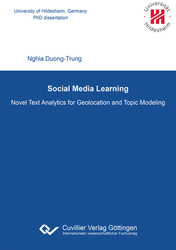| Departments | |
|---|---|
| Book Series (97) |
1381
|
| Nachhaltigkeit |
3
|
| Gesundheitswesen |
1
|
| Humanities |
2370
|
| Natural Sciences |
5407
|
| Mathematics | 228 |
| Informatics | 319 |
| Physics | 980 |
| Chemistry | 1364 |
| Geosciences | 131 |
| Human medicine | 243 |
| Stomatology | 10 |
| Veterinary medicine | 108 |
| Pharmacy | 147 |
| Biology | 835 |
| Biochemistry, molecular biology, gene technology | 121 |
| Biophysics | 25 |
| Domestic and nutritional science | 45 |
| Agricultural science | 1005 |
| Forest science | 201 |
| Horticultural science | 20 |
| Environmental research, ecology and landscape conservation | 148 |
| Engineering |
1798
|
| Common |
98
|
|
Leitlinien Unfallchirurgie
5. Auflage bestellen |
|
Advanced Search
Social Media Learning (English shop)
Novel Text Analytics for Geolocation and Topic Modeling
Nghia Duong-Trung (Author)Preview
Extract, PDF (2 MB)
Table of Contents, PDF (1.9 MB)
Living in the reign of social media, the online platforms and services have become inseparable to billions of individuals. In particular, social media is a technological enabler that encourages the unlimited creation and distribution of a large amount of data by individuals regardless of location and time. A wide variety of social media platform enables the effective acquirement and collection of large-scale data that give a rise to major computational challenges. Since information is ubiquitous and overwhelmingly available, social media has provided us with extraordinary opportunities to understand human behavior patterns at scale. The increasing amount of rich user-generated contents from various repositories and formations have urged a demand for advanced technologies designed for automatically learning interesting patterns from the data in a dynamic and scalable fashion. From the research perspective, one can see the prospect of available and easy access to a deluge of data that calls for business and academics opportunities in a diverse range of analytical and learning contexts. Social media learning is an interdisciplinary research field that encompasses techniques from computer science, machine learning, social network analysis, data mining, natural language processing, information retrieval, optimization, and mathematics. It embraces state-of-the-art researches to methodically characterize, formulate, model, measure, evaluate, and mine meaningful patterns from large-scale social media data.
In this dissertation, we identify several promising issues in social media, geolocation and topic modeling, and develop robust machine learning algorithms to address them. Regarding to geolocation issue, we recognize a huge demand of novel models and applications for geotagged data not only in machine learning communities but also in business and beyond. Indeed, we introduce a novel geolocation prediction scenario and develop a state-of-the-art algorithm. Regarding to topic modeling problem which has undoubtedly become one of the most important techniques in big data mining, we develop a strategy of topic selection that outperforms previous state-of-the-art. Further developed upon our finding, we integrate our novel topic model with spatial characteristics of geotagged data and propose a general framework for hierarchical topic discovery.
Social media learning cultivates new computational theories and methodologies to help understand individuals, provide relevant recommendations, and benefit communities. We believe that our contributions on several crucial issues would inspire researchers in further improvements.
| ISBN-13 (eBook) | 9783736985452 |
| Language | English |
| Page Number | 144 |
| Edition | 1. |
| Publication Place | Göttingen |
| Place of Dissertation | Hildesheim |
| Publication Date | 2017-07-12 |
| General Categorization | Dissertation |
| Departments |
Informatics
|
| Keywords | Social Media, Machine Learning, Text Mining, Geolocation, Topic Modeling, Document Clustering |








